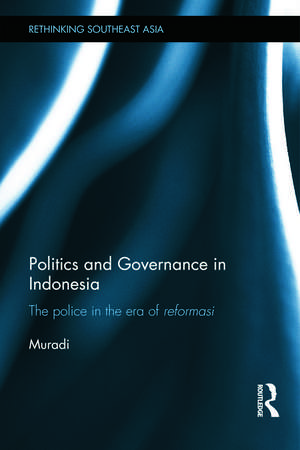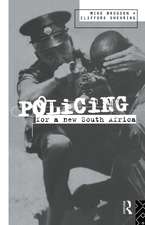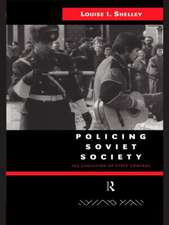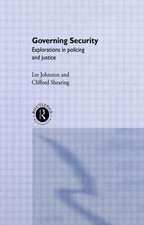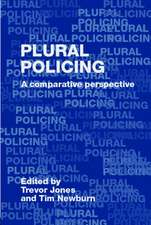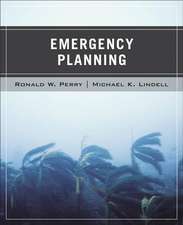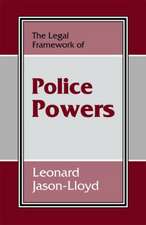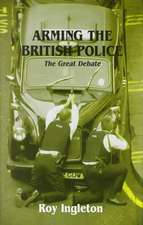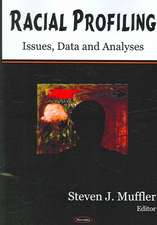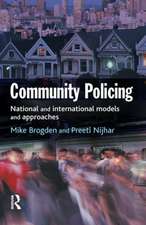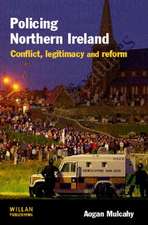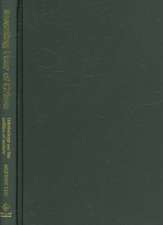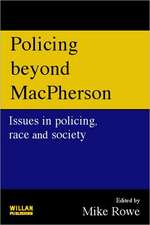Politics and Governance in Indonesia: The Police in the Era of Reformasi: Rethinking Southeast Asia
Autor Muradien Limba Engleză Hardback – 19 mai 2014
Based on direct observations by a scholar who was involved in the last days of the New Order and who saw how the police responded to regime change, this book examines the police, the new regime, and how the police was disassociated from the military in Indonesia. Providing a comprehensive historical overview of the position of police in this change of regime, the book focuses on two key areas: the differences between local and national levels, and the politicisation associated with decentralisation. Arguing that the disassociation of the Indonesian National Police from the military has achieved only limited success, the book contends that there is continued impetus for the establishment of a professional police force and modern and democratic policing, which will entail effective public control of the police.
A pioneering study of the police in Indonesia, examining key issues in the post-Suharto era, this book will be of interest to scholars of Southeast Asian politics and of policing and politics in the developing world.
Din seria Rethinking Southeast Asia
-
 Preț: 351.25 lei
Preț: 351.25 lei -
 Preț: 198.92 lei
Preț: 198.92 lei -
 Preț: 372.62 lei
Preț: 372.62 lei -
 Preț: 416.26 lei
Preț: 416.26 lei - 26%
 Preț: 821.53 lei
Preț: 821.53 lei -
 Preț: 409.13 lei
Preț: 409.13 lei -
 Preț: 426.83 lei
Preț: 426.83 lei - 17%
 Preț: 296.31 lei
Preț: 296.31 lei -
 Preț: 395.00 lei
Preț: 395.00 lei -
 Preț: 416.22 lei
Preț: 416.22 lei -
 Preț: 410.28 lei
Preț: 410.28 lei - 13%
 Preț: 338.33 lei
Preț: 338.33 lei -
 Preț: 382.16 lei
Preț: 382.16 lei - 18%
 Preț: 1025.91 lei
Preț: 1025.91 lei -
 Preț: 384.66 lei
Preț: 384.66 lei -
 Preț: 411.64 lei
Preț: 411.64 lei -
 Preț: 369.39 lei
Preț: 369.39 lei - 18%
 Preț: 1058.65 lei
Preț: 1058.65 lei
Preț: 570.93 lei
Preț vechi: 1103.72 lei
-48% Nou
Puncte Express: 856
Preț estimativ în valută:
109.25€ • 116.82$ • 91.09£
109.25€ • 116.82$ • 91.09£
Carte tipărită la comandă
Livrare economică 17 aprilie-01 mai
Preluare comenzi: 021 569.72.76
Specificații
ISBN-13: 9780415713719
ISBN-10: 0415713714
Pagini: 208
Ilustrații: 4 line drawings
Dimensiuni: 156 x 234 x 18 mm
Greutate: 0.54 kg
Ediția:1
Editura: Taylor & Francis
Colecția Routledge
Seria Rethinking Southeast Asia
Locul publicării:Oxford, United Kingdom
ISBN-10: 0415713714
Pagini: 208
Ilustrații: 4 line drawings
Dimensiuni: 156 x 234 x 18 mm
Greutate: 0.54 kg
Ediția:1
Editura: Taylor & Francis
Colecția Routledge
Seria Rethinking Southeast Asia
Locul publicării:Oxford, United Kingdom
Public țintă
PostgraduateCuprins
Introduction: The Transition to Democracy and the Police: Theories and the Case of Indonesia Part 1: Historical Legacies and early Reformasi 1. The Police in Sukarno’s Era: From Colonial State to the Overthrow of the Guided Democracy State 2. Under the Thumb: the Police During Suharto’s New Order and Early Reformasi Part 2: Reformasi and its effect on the police 3. Politicization on the Police: The Struggle Over Wahid Presidential Control 4. Developing a More Independent and Professional of the Police Part 3: Consolidation, Development and Corruption 5. Resolving the Divisive Issues of the Rival Chiefs and the Group of Eight 6. Corruption in the Police Part 4: Local Perspectives 7. Cosmetic Changes: Roles of the Police in Local Areas 8. The Budget, Local Politics and Jealously 9. Politicization of the Police Part 5: National Perspectives 10. The Internal Conflicts and the Effect of Extortion Activities 11. The Police Budget and Extortion Activities 12. Conclusion: Disassociation and the Reforms of the Police - Its Position and Relationship in Post-Suharto Indonesia
Notă biografică
Muradi received his PhD from Flinders University, Australia. He is Senior Lecturer in the Department of Government, Faculty of Political and Social Sciences at the University of Padjadjaran, Jatinangor, Indonesia.
Recenzii
"Muradi’s work is necessary reading not only for researchers but also for the Polri and Indonesian leaders."
Wildan Sena Utama Universitas Gadjah Mada
Wildan Sena Utama Universitas Gadjah Mada
Descriere
How does an authoritarian state reform its police force following a transition to democracy? In 1998, Indonesia, the third largest country in the world, faced just such a challenge. This book explains the changing position of the police in the post-Suharto era in Indonesia.It focuses on two key areas: the differences between local and national levels, and the politicization associated with decentralization. Arguing that the disassociation of the Indonesian National Police from the military has achieved only limited success, the book contends that there is continued impetus for the establishment of a professional police and modern and democratic policing, which will entail an effective public control on the police.
